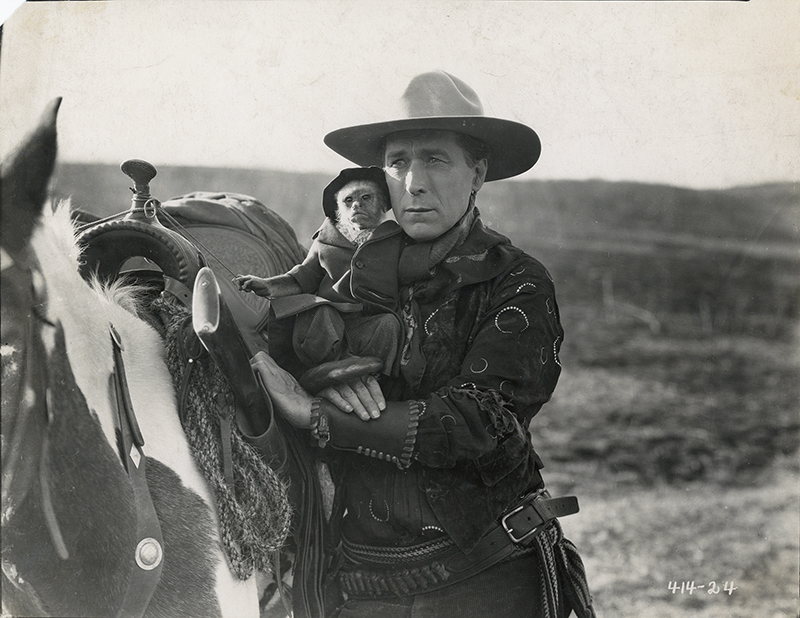|
|


Click image to enlarge
| Download archival scan
(From left): Fritz the paint horse, Jocko the Monkey and William S. Hart the cowboy actor star in "Travelin' On" (Paramount-Artcraft 1922), directed by Lambert Hillyer from an original story by Hart that can be read here. Original publicity still No. 414-24, 8x10 inches. In the story, Hart's character receives the monkey from a Spanish dance hall girl named Carmen Rosa; after all, what Spanish dance hall girl isn't named Carmen and doesn't have a pet capuchin monkey? This wasn't the first monkey to be named Jocko — the name appears in literature in the 1830s — but this one was the most famous, inspiring several lines of hand puppets and other toys. It seemed that anyone who had a pet monkey afterward just had to name it Jocko. This Jocko appeared in several films in the early 1920s including the 1925 screen adaptation of Sir Arthur Conan Doyle's "The Lost World" and the 1927 Harold Lloyd comedy, "The Kid Brother" — which are easier to come by today than "Travelin' On," although prints of the Hart film are said to reside in the Library of Congress collection and the Museum of Modern Art in New York.
About "Travelin' On," the Motion Picture. From Koszarski (1980:137): Produced by the William S. Hart Company; distributed by Paramount-Artcraft; released March 11, 1922; ©February 24, 1921; seven reels (6267 feet). Directed by Lambert Hillyer; screenplay by Lambert Hillyer from the story "J.B. the Unbeliever" by William S. Hart; photographed by Joe August; art director, J.C. Hoffner; art titles by Harry Barndollar. (Note: "J.B. the Unbeliever" might have been a working title of the picture, but the original short story, per Hart, is titled "Travelin' On.") CAST: William S. Hart (J.B.); James Farley (Dandy Allen McGee); Ethel Grey Terry (Susan Morton); Brinsley Shaw (Hi Morton); Mary Jane Irving (Mary Jane Morton); Robert Kortman (Gila); Willis Marks ("Know-It-All" Haskins); Fritz ("Spots"); Jocko the Monk (as himself). SYNOPSIS: J.B., a Western wanderer, reaches the town of Tumble Bluff about the same time as Hi Morton, a zealous preacher. McGee, who owns the saloon and dance hall, resents the preacher's presence and also incurs the enmity of J.B., who does not trust him. Both McGee and J.B. covet Morton's wife, but she resists their advances. J.B. rescues her from McGee and then sees himself as he really is. [On a stormy night J.B. goes in search of the monkey given to him by a dance-hall girl. While he is gone Morton borrows "Spots," J.B.'s pinto horse. Riding the horse,] Morton, who was formerly a highwayman, holds up the stage coach to get money to finish the church. He is arrested and sentenced to be hung. J.B., to save the woman he loves, thereupon assumes the guilt, frees Morton and then makes his escape. [Moving Picture World, March 25, 1922] REVIEWS: Travelin' On seems slower and a bit below the average of pictures usually offered by Hart. ... this one is not nearly as full of action and sure-fire situations as most of the others. The picture is over six reels and the story, written by Hart, doesn't contain sufficient situations to carry it over five reels. ... [He] has written much better stories and while he has provided himself with a good part, the others are not strong ... a good deal of padding such as the prominence given the monkey, and the numerous titles ... help consume the six reels. Travelin' On is said to be the star's last picture, or at least the last one which Paramount will release unless a new contract is made. ... [Wid's, March 19, 1922] Typical William S. Hart production — fitly describes this star's latest Paramount feature, Travelin' On. It compares favorably with any of his recent productions and should prove perfectly satisfactory to lovers of Westerns and admirers of William S. Hart in particular ... there are a number of thrilling moments in the story, particularly where the hero on successive occasions saves himself by his unusual quickness on the draw. ... [C. S. Sewell, Moving Picture World, March 25,1922]
LW3429: 9600 dpi jpeg from original photograph purchased 2017 or 2018 by Leon Worden.
|
WATCH FULL MOVIES
Biography
(Mitchell 1955)
Narrated Biopic 1960
Biography (Conlon/ McCallum 1960)
Biography (Child, NHMLA 1987)
Essay: The Good Bad Man (Griffith & Mayer 1957)
Film Bio, Russia 1926
The Disciple 1915/1923
The Captive God 1916 x2
The Aryan 1916 x2
The Primal Lure 1916
The Apostle of Vengeance (Mult.)
Return of Draw Egan 1916 x2
Truthful Tulliver 1917
The Gun Fighter 1917 (mult.)
Wolf Lowry 1917
The Narrow Trail 1917 (mult.)
Wolves of the Rail 1918
Riddle Gawne 1918 (mult.)
"A Bullet for Berlin" 1918 (4th Series)
The Border Wireless 1918 (Mult.)
Branding Broadway 1918 x2
Breed of Men 2-2-1919 Rivoli Premiere
The Poppy Girl's Husband 3-23-1919 Rivoli Premiere
The Money Corral 4-20-1919 Rialto Premiere
Square Deal Sanderson 1919
Wagon Tracks 1919 x3
Sand 1920 Lantern Slide Image
The Toll Gate 1920 (Mult.)
The Cradle of Courage 1920
The Testing Block 1920:
Slides, Lobby Cards, Photos (Mult.)
O'Malley/Mounted 1921 (Mult.)
The Whistle 1921 (Mult.)
White Oak 1921 (Mult.)
Travelin' On 1921/22 (Mult.)
Three Word Brand 1921
Wild Bill Hickok 1923 x2
Singer Jim McKee 1924 (Mult.)
"Tumbleweeds" 1925/1939
Hart Speaks: Fox Newsreel Outtakes 1930
|
The site owner makes no assertions as to ownership of any original copyrights to digitized images. However, these images are intended for Personal or Research use only. Any other kind of use, including but not limited to commercial or scholarly publication in any medium or format, public exhibition, or use online or in a web site, may be subject to additional restrictions including but not limited to the copyrights held by parties other than the site owner. USERS ARE SOLELY RESPONSIBLE for determining the existence of such rights and for obtaining any permissions and/or paying associated fees necessary for the proposed use.








































